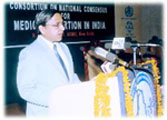 |

According
to the WHO, approximately 100 million people make love daily, resulting
in one million conceptions, and 150,000 abortions. The world population
increases by 100 million every year: 17 million in Africa, 10 million
in Latin America and 55 million in Asia; in India, 44 babies are born
every minute. Sadly, many pregnancies are unwanted, accidental, the
result of rape and incest, or wanted but not affordable. Others are
a risk to maternal health. According to WHO, about one-third of the
150,000 abortionsworldwide are unsafe; and a woman dies every seven
minutes as a consequence. Annually, as many as 600,000 women die through
lack of contraception which leads to pregnancy.
In India, after the introduction of Medical Termination
of Pregnancy (MTP) Act in 1972 legalizing abortion, reported MTP cases
have been on the increase. According to available statistics, the number
of approved institutions providing MTP facilities has increased from
1877 in 1976 to 7121 in 1991. Similarly, the number of MTP cases from
a mere 25 reported in the year 1972-73, has gone up to in 632526 in
1991-92. However, these figures are only the tip of the iceberg as it
is estimated that, in India, every year, an additional 5-6 million abortions
are conducted by
private practitioners. Majority of these cases are done in rural areas
having inadequate facilities and hence done in an unhygienic and unscientific
way.
Despite the fact that MTP has been legally approved
in India for more than three decades, its services are not easily accessible
to majority of the women, particularly in the rural areas. At the departmental
level, MTP has remained a neglected area. At the time of allocation
of resources, it receives the lowest priority. Since 1991-92, it is
fixed at Rs.150 lakhs (US$ 435,000 approx.) annually which is totally
inadequate. The donor agencies that have
contributed significantly in expanding health and family welfare facilities
in the country have also not shown any interest in supporting MTP program.
Consequences of unwanted pregnancy can be quite
severe. Every year, 11 million abortions take place and at least half
are unsafe. Nearly all deaths and serious morbidity resulting from unwanted
pregnancies occur in developing countries. In India 20,000 deaths occur
every year due to abortion. Surgical abortion may be undesirable to
some women, requires skill and may be unsafe and potentially lethal
in unskilled hands. Medical abortion using drugs – mifepristone
and misoprostol can be delivered in a manner that is safe, effective
and acceptable to women.
Medical abortion has the potential to improve
women’s health and advance their reproductive rights. Medical
abortion can be used safely in even the most basic-setting (non-physician
worker) as long as back-up care is available to treat women who experience
complications or failure. It is highly effective in early pregnancy,
but we need to regulate the sale of drug and formulate country specific
guidelines, taking into consideration a large number of ISM
providers in our country.
There is an urgent need to have a dedicated centre
for reproductive healthcare to provide leadership in women’s healthcare
all over the country. With these words, I thank the organisers for inviting
me and sharing my views on the subject and wish all the success for
the consortium.
|
 |

|